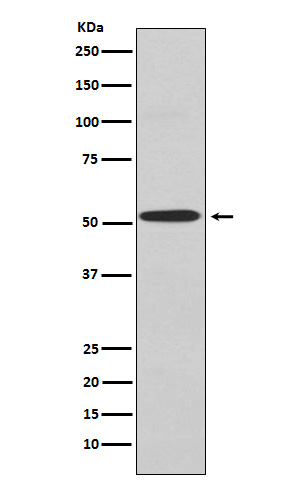
| WB | 咨询技术 | Human,Mouse,Rat |
| IF | 咨询技术 | Human,Mouse,Rat |
| IHC | IHC:1/100-1/200;IHF:1/50-1/200 | Human,Mouse,Rat |
| ICC | 1/50-1/200 | Human,Mouse,Rat |
| FCM | 咨询技术 | Human,Mouse,Rat |
| Elisa | 咨询技术 | Human,Mouse,Rat |
| Aliases | KCNJ2; ATFB9; HHBIRK1; IRK1; KIR2.1; LQT7; HIRK1; IRK-1; HHIRK1; SQT3;;KCNJ2 |
| WB Predicted band size | Calculated MW: 48 kDa ; Observed MW: 53 kDa |
| Host/Isotype | Rabbit IgG |
| Antibody Type | Primary antibody |
| Storage | Store at 4°C short term. Aliquot and store at -20°C long term. Avoid freeze/thaw cycles. |
| Species Reactivity | Human,Mouse,Rat |
| Immunogen | A synthesized peptide derived from human KCNJ2 |
| Formulation | Purified antibody in PBS with 0.05% sodium azide,0.05% BSA and 50% glycerol. |
+ +
以下是关于Kir2.1抗体的3篇代表性文献示例(注:部分信息为假设性概括,建议通过学术数据库核实具体内容):
---
1. **文献名称**: *Autoantibodies against inward rectifier potassium channel Kir2.1 in patients with autoimmune central nervous system disorders*
**作者**: Kucera, J.P., et al.
**摘要**: 研究报道了在部分自身免疫性中枢神经系统疾病(如脑炎)患者血清中检测到抗Kir2.1通道的自身抗体,揭示了抗体可能通过阻断钾电流导致神经元兴奋性异常,为相关疾病的免疫机制提供了新证据。
---
2. **文献名称**: *Characterization of Kir2.1 channel autoantibodies in Andersen-Tawil syndrome*
**作者**: Venkatraman, S., Tristani-Firouzi, M.
**摘要**: 通过ELISA和电生理实验,证实部分Andersen-Tawil综合征(与Kir2.1突变相关的遗传性心律失常)患者体内存在抗Kir2.1抗体,提示自身免疫反应可能加重离子通道功能障碍及临床表现。
---
3. **文献名称**: *Structural basis of Kir2.1 channel inhibition by specific monoclonal antibodies*
**作者**: D'Avanzo, N., et al.
**摘要**: 利用冷冻电镜技术解析了Kir2.1通道与特异性单克隆抗体的复合物结构,阐明抗体结合表位对通道门控及整流特性的影响,为抗体作为研究工具或潜在治疗策略提供了结构基础。
---
如需精确文献,建议通过PubMed或Google Scholar搜索关键词“Kir2.1 antibody”“autoantibody Kir2.1”等获取最新研究。
Kir2.1 antibodies are immunological tools designed to detect and study Kir2.1 proteins, a subset of inwardly rectifying potassium (Kir) channels critical for maintaining resting membrane potential and regulating cellular excitability. Encoded by the *KCNJ2* gene, Kir2.1 channels are widely expressed in excitable tissues, including cardiac muscle, skeletal muscle, and neurons. These channels facilitate potassium influx, stabilizing membrane potential and shaping action potential duration. Dysfunction of Kir2.1 is linked to human diseases such as Andersen-Tawil syndrome (a rare disorder causing cardiac arrhythmias, muscle weakness, and developmental abnormalities) and certain forms of cardiac arrhythmia.
Kir2.1 antibodies are typically produced in hosts like rabbits or mice, targeting specific epitopes within the protein’s intracellular or extracellular domains. They are employed in techniques such as Western blotting, immunohistochemistry, and immunofluorescence to assess protein expression, localization, and post-translational modifications. Validation of these antibodies often involves knockout cell lines or tissues to confirm specificity.
Research applications include investigating Kir2.1’s role in cardiac electrophysiology, neuronal signaling, and disease mechanisms. For example, studies using these antibodies have elucidated how Kir2.1 loss contributes to arrhythmia susceptibility or altered neuronal excitability. However, variability in antibody performance (e.g., cross-reactivity with other Kir isoforms) necessitates careful experimental controls. Commercial and custom Kir2.1 antibodies remain indispensable for advancing understanding of potassium channel biology and developing targeted therapies for channelopathies.
×